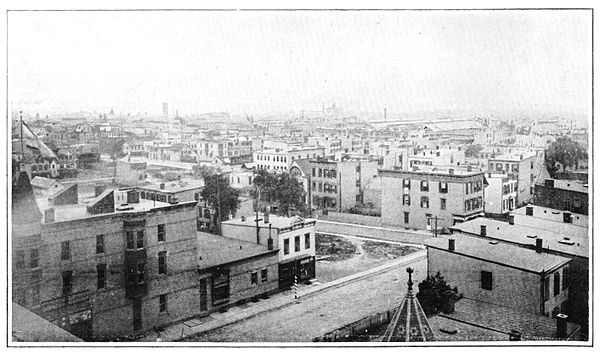History of West Hoboken N.J./Chapter 11
CHAPTER XI. Latter Municipal Affairs. As stated before, the township became a town in 1884. While it was governed under the township laws it had three township committeemen until the year 1868, and after this latter year it had five councilmen to govern it, who were elected at large, no ward or district lines being drawn. This method was in force until the year 1891, when the town adopted the special charter for towns, which was passed at the instance of West Hoboken. This charter provided for the election of a councilman-at-large and the establishment of not less than three wards, which are represented by two councilmen, making a board of council, consisting of seven members. Under this charter Mr. Charles J. Chandless was elected the first councilman-at-large. In politics the town in its early history was non-partisan, that is, its citizens were elected to office in the majority of cases regardless of their politics. This state of affairs continued until the adoption of the last charter. When the ward lines were established it resulted in political clubs being formed and the injecting of party politics in the spring elections. At the first election, under the present charter, the Democratic party swept the town, and with the exception of one year (1894), they have continued in power since that time. In the latter year an Independent ticket was placed in the field by the Municipal Club, an organization composed of independent citizens, and after a hot campaign the entire independent ticket was declared elected. In the spring of 1893, Mr. Benj. Day was the candidate for councilman-at-large on the municipal ticket, and Mr. Chas. J. Chandless (who had already served two terms), was the Democratic candidate. After the Board of Canvassers had declared Mr. Day elected, Mr. Chandless contested the election on the ground that several marked ballots were counted for Mr. Day. Ex-Judge Lippincott decided the case in favor of Mr. Day, but Mr. Chandless's attorneys immediately appealed the case, and the higher court reversed Lippincott's decision, and declared Mr. Chandless elected councilman-at-large. But there were four councilmen in the board who were elected by the municipals, as follows:—Messrs. B. Fitzgerald, Geo. F. McEwan, Chas. Solyum and Jacob Leuly. This board started out as reformers generally do, and, although their |
intentions were undoubtedly of the best, they being all honest, conscientious citizens, their efforts at reform were entirely to aggressive, and they soon made for themselves a host of enemies. They cut down the salaries of the policemen, the street laborers, the various town officials, and their own salaries. Every appropriation was cut down lower than the preceding year, and from the standpoint of the taxpayer, I suppose their efforts were appreciated, but if so, at the following election very few taxpayers could have voted because these reformers were each one defeated and the Democrats again came in control of town affairs. At the election in 1899, Mr. Geo. B. Bergkamp was elected councilman-at-large, and while in office he managed to get into the disfavor of several of the Democratic leaders in the town, and when he came up for renomination, they pitted Thos. Nolan against him at the primaries. Nolan received the nomination and Bergkamp announced that he was an independent candidate. The Republicans nominated Mr. E. C. Euvrard, and this made it a three-cornered fight. The Republicans were rent apart by factional fights. The Democrats were divided by the fight over Bergkamp, and the ensuing election became the hottest and most bitterly contested in the history of the town. When the ballots were counted it was found that Bergkamp had proved his popularity and was elected by a greater majority than his Republican opponent received votes. To sum up, our town is to-day the largest in the State, having grown from a small village of 1,500 in 1861, to the present population of nearly 30,000 people in 1902. We note in our midst some of the finest residences in North Hudson; our town is well taken care of in regards police; our force consisting of 1 chief, 1 captain, 1 detective, 2 sergeants, 3 roundsmen and 24 patrolmen. In regards our fire department anything I might say in its favor would very likely be termed a biased opinion, but let our citizens try and remember the last time a fire got beyond control of our fire department, and compare the result with departments in other towns and cities the size of ours. We have among us 14 churches, among which is the Monastery of the Passionist Fathers, beyond the shadow of a doubt one of the finest religious edifices in the State. We have a beautiful public park, which was given to us by the Hoboken Land and Improvement Company. The stores in our town can and do supply our citizens with their smallest and largest wants, at prices which compare favorably with those of the metropolis.
|




